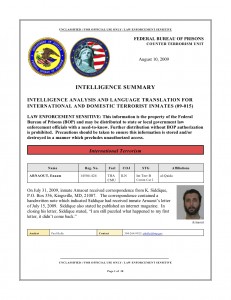 The Counter-Terrorism Unit briefs prison officials and law enforcement about the communications of “terrorist” prisoners. It’s an important function, since prisoners have actually communicated with terrorist cells from within U.S. prisons; in 2005, it was revealed that three men convicted of bombing the World Trade Center in 1993 wrote 90 letters to extremists abroad. And they did it from within the Supermax.
The Counter-Terrorism Unit briefs prison officials and law enforcement about the communications of “terrorist” prisoners. It’s an important function, since prisoners have actually communicated with terrorist cells from within U.S. prisons; in 2005, it was revealed that three men convicted of bombing the World Trade Center in 1993 wrote 90 letters to extremists abroad. And they did it from within the Supermax.
This unit was created to prevent such potentially fatal errors from happening again. However, new documents raise some troubling questions about the Counter-Terrorism Unit’s priorities:
The unit is monitoring the PR campaigns of environmental activists, and its briefings have included my lectures and this website.
Communications of “Terrorist” Prisoners
I received the documents from the staff of Public Intelligence, a Wikileaks-style organization. They are titled “Intelligence Summary: Intelligence analysis and language translation for international and domestic terrorist inmates†(and can now be viewed online here and here). They “may be distributed to state or local government law enforcement officials with a need-to-know,†the documents note, but “precautions should be taken to ensure this information is stored and/or destroyed in a manner which precludes unauthorized access.â€
So what information is deemed relevant to counter-terrorism officials and local law enforcement?
It varies wildly. Stephen Jordi, who planned to bomb abortion clinics, received a letter from a man campaigning to become governor of Georgia, who vowed “fighting to the death if the Federal government tries to enforce their murderous, ungodly law allowing abortion and homosexual activities in this State.â€
In stark contrast, the unit notes that Essam El Shami wrote his son to “keep on praying and take care of the school and work,†and “take care of mama.â€
It’s not surprising that seemingly innocuous communications are reported alongside potential threats. Even the most mundane bits of prisoner letters, phone calls, emails and visits may be worthy of law enforcement attention. They may, for instance, actually be coded threats.
However, that’s not what’s going on with the reports on environmentalists labeled “eco-terrorists.†In these documents, government officials make clear they are much more concerned about bad PR.
Monitoring Bad PR
The Counter-Terrorism Unit notes an August 7, 2009 email received by Daniel McGowan, an Earth Liberation Front prisoner, regarding a possible vigil to raise awareness about secretive political prisons called Communications Management Units (CMUs). McGowan is part of a lawsuit against the experimental prison units. The author, who is identified as part of a public relations group, proposes a caravan between the two prison units to gain media attention.
Another email to McGowan was from Matthew Strugar, an attorney with the Center for Constitutional Rights (the group which brought one of the CMU lawsuits). On July 28, 2009, Strugar wrote McGowan and discussed efforts to raise awareness about the CMUs and challenge them.
According to the report:
Strugar described attending the animal rights conference in Los Angeles two weeks prior, in which an individual identified as Will spoke about inmate McGowan and his co-defendants’ cases, as well as the Communications Management Units (CMU). Will is believed to be Will Potter, an independent journalist based in Washington, DC… [emphasis added]
In his email, Strugar wrote to McGowan: “Will was on four panels, I think, and talked a bit about you and your co-defendants’ cases and the situation with the CMUs. He’s a good advocate on that issue. There is still a lot of organizing and discussion about the Green Scare generally, which is good, and I talked a bit about green scare speech repression and the like. It was interesting.â€
Wasting Government Counter-Terrorism Resources
It’s unsettling to see my name in documents produced by the Counter-Terrorism Unit. What’s even more disturbing, though, is the thought of scarce government resources being wasted on such reports.
The Counter-Terrorism Unit was created because of flaws in how the government monitors “terrorist” prisoners. It’s crucial to note, though, that an audit by the inspector general’s office revealed that the problem arose not from the inadequacy of the tools available to monitor terrorist communications, but from inconsistent implementation by untrained staff.
Those problems persist. Lectures, public websites and First Amendment activity by journalists and attorneys should not be the purview of the Counter-Terrorism Unit. And even if you think that it should be, and even if you think I am some kind of potential terrorist, this “intelligence briefing” is absolutely useless. Any intern could have created the same report using Google.
Think of it this way: Counter-terrorism officials had read the email, researched who named ‘Will’ spoke at the animal rights conference, figured out it was me, Googled my website, wrote about it in this report, did the same for Rachel Meeropol and other advocates, and then distributed this document to other prison officials who similarly wasted their time reading about the lawful actions of a journalist, an attorney, and others. Allocating government resources in this way places everyone at risk.
I have attempted to contact Joyce Lane-Lewis, who is listed as the author of the reports on Daniel McGowan, so I can talk to her about this. In the interest of saving taxpayer money, I hope the Counter-Terrorism Unit contacts me the next time they need this type of information: I would be happy to get that for them.